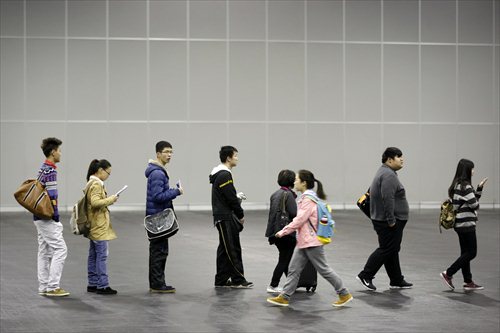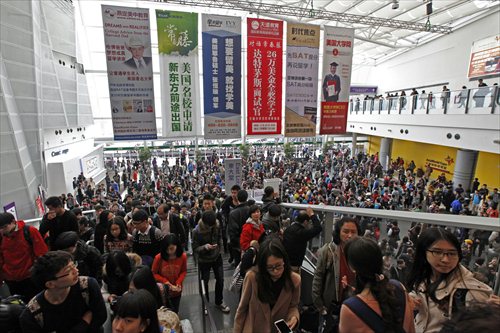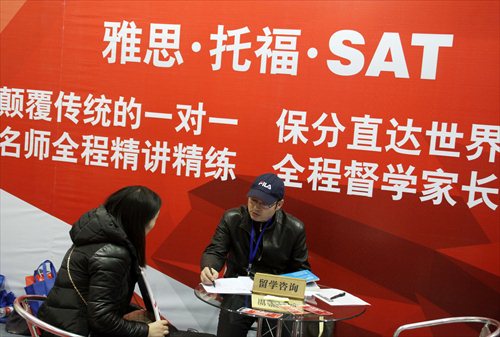HOME >> METRO SHANGHAI
Testing times for students
Source:Global Times Published: 2016/5/22 16:53:01
In the wake of leaks and cheating scandals the SAT (the Scholastic Aptitude Test) undertook a series of reforms, and May 7 saw the first revised format for SAT in Asia.
AsiaWorld-Expo, the largest SAT test center in Hong Kong, used to be packed with candidates in past years but now it is seeing a significant decrease in numbers.
"Once there were more than 10,000 candidates at a time and they filled two or three halls. This year, just one hall is all that is needed," said a teacher from a Shanghai test prep company who had accompanied his students in HK.
One insider said the big drop in numbers was because students were adopting a "wait-and-see" attitude. "This year, after the reforms, students have no idea how hard or easy the first SAT in Asia is. Every SAT test score is kept on record. Although colleges allow students to submit only their best scores, taking the tests repeatedly could provoke suspicions of cheating. So at this stage students prefer to just watch and wait," the insider said.

Largest center
Every year, thousands of students from the Chinese mainland fly to Hong Kong, Taiwan or South Korea to sit for SAT tests, because there are no test centers in the Chinese mainland to date. AsiaWorld-Expo, Hong Kong's largest test center, used to receive around 10,000 students from the Chinese mainland every year but this May the single No. 7 hall was enough to accommodate all the candidates.
A student surnamed Chen from a high school in Hongkou district, Shanghai, was one of those taking the test for a second time. In contrast with previous years, when prep companies flooded media with blaring loud promotional campaigns, this year the promotions seemed lackluster and there was a big drop in the number of students, Chen said.
Yuan Zhengxiang is the CEO of OvEdu, an educational consulting firm in Shanghai and said the drop in the number of candidates was caused by several factors. On one hand, there was a lack of referential test resources like official sample tests and instructions for the new SAT test. If a student was given a bad score, he or she might need to retake the test. On the other hand, taking the test more than once might have the student suspected of cheating, which could have a negative effect on their future applications. At present the prep companies and the students are uncertain about the new SAT and so they are waiting.
In previous years, a bizarrely large number of high or even perfect scores from Chinese students triggered the US College Board's (CB) suspicions of the integrity of Asian students.
"Some Chinese students are very good at taking exams and some coaching institutions took advantage of the time differences. They sent teachers to the North American tests and then passed the test questions on to the Chinese students which gave them the opportunity to attain these perfect scores," one expert revealed.
The expert predicted that the new SAT tests would be more strictly supervised and prep companies would not be able to use old techniques and subterfuges.
The CB has adopted measures against cheating primarily by changing the test times from March to May for first-time candidates over 22. Candidates also now have to sign confidentiality agreements.
In a recent email from CB to candidates for the June SAT, students are told that they have to complete the verification form by 5 pm on April 19 outlining their reasons for sitting the exam. If they miss this deadline the CB will cancel their tests and refund their registration fees.
The perfect full score for the new SAT has been reduced from 2,400 to 1,600. As well candidates will not lose marks for attempting difficult problems even if they do not answer them entirely correctly.

Longer passages
Shanghai students who sat the exam in May said the new test included longer comprehension passages on US history and science and technology with the latter making up the majority of the exam.
"It took me six hours to finish the test - I started at 8 am and finished at 2 pm," said Chen, a student from a Shanghai high school who was sitting the test for the first time.
Jiang Qi is the director general of the educational consulting firm OneBest.cn and said there were two reasons for the CB reforms. "One is that its test questions were too old and some questions were being leaked, and the other is the fierce competition from ACT (the American College Test), another major US test system." According to Jiang, more than half of the exam candidates in the US now take the ACT test since 2012.
The ACT is less demanding for students, requiring a lower standard for vocabulary and featuring more science and technology related subjects.
"We learned from students who sat the new SAT that the comprehension passages are now relatively easier for most Chinese students who study English as a second language and do not aim for very high scores," Jiang said. "In comparison with the old SAT, the new exam passages aren't as dreary and don't cram in large numbers of new words."
SAT scores are recognized by more than 4,000 higher education institutions in the US. It used to be a must for acceptance by prestigious universities. It has been 10 years since the system was introduced to China and it not only attracted thousands from the Chinese mainland to take the test in Hong Kong every year, but also cultivated a "gray industry" where test answers could be bought or sold.

Not compulsory
With reports of leaks surging over the past two years, some American universities are no longer making the SAT test a compulsory requirement but use it as a reference point. A recent Harvard University report shows that more than 850 universities now enroll students without requiring SAT or ACT scores. Joining this group are another 200 accredited universities including New York University, Brandeis University and Hamilton College.
An admissions official with Boston College told Shanghai media that the old SAT was not closely related to actual high school knowledge although it served to predict initial performances for new college students. As well some universities dropped SAT as a requirement to achieve a higher diversity of students.
"The standard tests were meant to create fair recruitment criteria for students from different social classes, but in recent years fairness has been significantly harmed with prep companies charging a lot to help students pass the exams," the official said. It is understood that the SAT reforms aim to enhance its validity so that it is more closely related to the high school curriculum.
In the meantime students need to remain committed to the SAT/ACT exams, because they are still listed as requirements for most American colleges.
Compiled by the Global Times based on an article from the Xinmin Evening News
AsiaWorld-Expo, the largest SAT test center in Hong Kong, used to be packed with candidates in past years but now it is seeing a significant decrease in numbers.
"Once there were more than 10,000 candidates at a time and they filled two or three halls. This year, just one hall is all that is needed," said a teacher from a Shanghai test prep company who had accompanied his students in HK.
One insider said the big drop in numbers was because students were adopting a "wait-and-see" attitude. "This year, after the reforms, students have no idea how hard or easy the first SAT in Asia is. Every SAT test score is kept on record. Although colleges allow students to submit only their best scores, taking the tests repeatedly could provoke suspicions of cheating. So at this stage students prefer to just watch and wait," the insider said.

Students queue to enter the test room to take the SAT. Photo: CFP
Largest center
Every year, thousands of students from the Chinese mainland fly to Hong Kong, Taiwan or South Korea to sit for SAT tests, because there are no test centers in the Chinese mainland to date. AsiaWorld-Expo, Hong Kong's largest test center, used to receive around 10,000 students from the Chinese mainland every year but this May the single No. 7 hall was enough to accommodate all the candidates.
A student surnamed Chen from a high school in Hongkou district, Shanghai, was one of those taking the test for a second time. In contrast with previous years, when prep companies flooded media with blaring loud promotional campaigns, this year the promotions seemed lackluster and there was a big drop in the number of students, Chen said.
Yuan Zhengxiang is the CEO of OvEdu, an educational consulting firm in Shanghai and said the drop in the number of candidates was caused by several factors. On one hand, there was a lack of referential test resources like official sample tests and instructions for the new SAT test. If a student was given a bad score, he or she might need to retake the test. On the other hand, taking the test more than once might have the student suspected of cheating, which could have a negative effect on their future applications. At present the prep companies and the students are uncertain about the new SAT and so they are waiting.
In previous years, a bizarrely large number of high or even perfect scores from Chinese students triggered the US College Board's (CB) suspicions of the integrity of Asian students.
"Some Chinese students are very good at taking exams and some coaching institutions took advantage of the time differences. They sent teachers to the North American tests and then passed the test questions on to the Chinese students which gave them the opportunity to attain these perfect scores," one expert revealed.
The expert predicted that the new SAT tests would be more strictly supervised and prep companies would not be able to use old techniques and subterfuges.
The CB has adopted measures against cheating primarily by changing the test times from March to May for first-time candidates over 22. Candidates also now have to sign confidentiality agreements.
In a recent email from CB to candidates for the June SAT, students are told that they have to complete the verification form by 5 pm on April 19 outlining their reasons for sitting the exam. If they miss this deadline the CB will cancel their tests and refund their registration fees.
The perfect full score for the new SAT has been reduced from 2,400 to 1,600. As well candidates will not lose marks for attempting difficult problems even if they do not answer them entirely correctly.

Thousands of Chinese students sit for the SAT in the AsiaWorld-Expo in a 2014 photo. Photo: CFP
Longer passages
Shanghai students who sat the exam in May said the new test included longer comprehension passages on US history and science and technology with the latter making up the majority of the exam.
"It took me six hours to finish the test - I started at 8 am and finished at 2 pm," said Chen, a student from a Shanghai high school who was sitting the test for the first time.
Jiang Qi is the director general of the educational consulting firm OneBest.cn and said there were two reasons for the CB reforms. "One is that its test questions were too old and some questions were being leaked, and the other is the fierce competition from ACT (the American College Test), another major US test system." According to Jiang, more than half of the exam candidates in the US now take the ACT test since 2012.
The ACT is less demanding for students, requiring a lower standard for vocabulary and featuring more science and technology related subjects.
"We learned from students who sat the new SAT that the comprehension passages are now relatively easier for most Chinese students who study English as a second language and do not aim for very high scores," Jiang said. "In comparison with the old SAT, the new exam passages aren't as dreary and don't cram in large numbers of new words."
SAT scores are recognized by more than 4,000 higher education institutions in the US. It used to be a must for acceptance by prestigious universities. It has been 10 years since the system was introduced to China and it not only attracted thousands from the Chinese mainland to take the test in Hong Kong every year, but also cultivated a "gray industry" where test answers could be bought or sold.

An agent from a test-prep company talks with his client. Photo: CFP
Not compulsory
With reports of leaks surging over the past two years, some American universities are no longer making the SAT test a compulsory requirement but use it as a reference point. A recent Harvard University report shows that more than 850 universities now enroll students without requiring SAT or ACT scores. Joining this group are another 200 accredited universities including New York University, Brandeis University and Hamilton College.
An admissions official with Boston College told Shanghai media that the old SAT was not closely related to actual high school knowledge although it served to predict initial performances for new college students. As well some universities dropped SAT as a requirement to achieve a higher diversity of students.
"The standard tests were meant to create fair recruitment criteria for students from different social classes, but in recent years fairness has been significantly harmed with prep companies charging a lot to help students pass the exams," the official said. It is understood that the SAT reforms aim to enhance its validity so that it is more closely related to the high school curriculum.
In the meantime students need to remain committed to the SAT/ACT exams, because they are still listed as requirements for most American colleges.
Compiled by the Global Times based on an article from the Xinmin Evening News
Posted in: Metro Shanghai, City Panorama